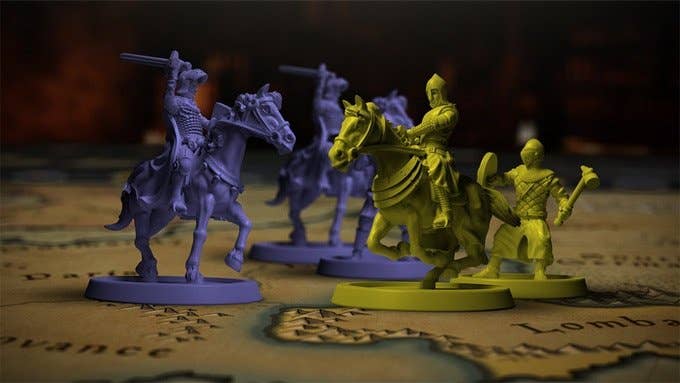Paradox: "People were coming to us in droves asking if we could make board games"
And the Swedish publisher is now licensing its biggest IPs to do just that
Paradox Interactive is allowing four of its biggest IPs to be turned into board games, one example of what CEO Fred Wester said will be much more licensing activity in the future.
The games were announced at the company's PDXCon event in Stockholm this weekend, with physical versions of Crusader Kings, Europa Universalis, Hearts of Iron and Cities: Skylines all at various stages of development. It is a move that delighted fans in the audience, though the most surprising aspect is that it hadn't happened sooner.
"Europa Universalis started out as a board game, and Johan [Andersson, creative director] took it into the digital space," Shams Jorjani, vice president of business development at Paradox Interactive, told GamesIndustry.biz. "Board games have always been very popular with everyone in the company. It's just that our business has always been focused on building our digital growth, and you don't plan on doing anything except for being that kind of company.
"You can still marry your horse in Crusader Kings. The important stuff"
"Paradox Interactive is about making digital games, and doing cool stuff with our IP in the digital space. It just got to the point where it became so abundantly clear that there was so many cool opportunities. People were coming to us in droves asking if we could make board games. We looked at that and said this is a a really cool way not necessarily to make tons and tons of money... But to expand what our IPs are and how people play them."
The company's Q1 results, which were published last week, show just how healthy the business is now, with huge growth in revenue and profits driven principally by expansions to its existing franchises. Paradox is so healthy, in fact, that Jorjani said that the resurgence in board games evident on crowdfunding platforms like Kickstarter was not the primary reason why the company chose this moment to pursue the idea.

"It [board games] is still freakishly small compared to how well PC gaming does - the scalability is completely different," he said. "But it's an underlying factor that shows there's a big resurgence in board games right now. There is more money in it, it's a lower hanging fruit, and it's easier for us to do it today compared to five years ago. Because five years ago we were so much focused on making the games. We're bigger now, so it's easier to try new things.
"And not only that but our IPs are bigger," added Susana Meza Graham, the company's COO. "We have people coming to us saying they have cool things that they want to do, and they want to license our IPs to do them. A few years ago we were building the IPs."
Each of the four board games is being made by a different company, all of which licensed the IPs from Paradox. According to Jorjani, the games are being playtested extensively within the company to ensure that each closely adheres to the brand of the game, and provides a good summation of the digital experience.
"It's not going to make us loads of money. That's not the thing"
"You can still marry your horse in Crusader Kings," he said. "The important stuff."
After an hour with the tabletop version of Crusader Kings - which is made by the Swedish company Free League Publishing - it's clear that Paradox absolutely intends for the games to capture the spirit of the source. It had all of the backstabbing, inbreeding, fratricide and, yes, equine nuptials that one would expect from the series, but with the added social dimension that comes with playing on a board, surrounded by friends.
"Board games are super social, which is an interesting feature," Fred Wester, CEO of Paradox, said. "Grand Strategy [video games] doesn't have any natural social connection. It's typically you yourself who decides to download Europa Universalis IV and play it, and then go through the ten-hour learning curve it takes to learn the game.

"It's not going to make us loads of money. That's not the thing. It's just building the brand in a different channel, and letting the people who play our games experience them in a different way."
Free League is using Kickstarter for its take on Crusader Kings, and the campaign - which launched on Saturday - has been a huge success. The funding target was set at SEK 500,000 ($57,000), and just over 48 hours later the total stands at more than SEK 1.5 million ($171,000). With another 29 days still to run, that figure could climb much, much higher.
"I think Free League is using Kickstarter as more as a pre-order, to see how interesting the game is to people," Wester told us shortly after the campaign launched. "I know that the game is basically finished. They already printed some prototypes. The rest is just manufacturing and making sure that people can buy it.
"We make sure they follow the brand guidelines, and that the games will actually be finished and delivered to the people who ordered them. I mean, we can't absolutely guarantee that, but as far as we can - we make sure to work with serious partners."
However much money Crusader Kings eventually raises, the initial burst of interest offers compelling evidence of the strength of the Paradox IP stable. According to Wester, board games is just one example of how the company could use its catalogue in new ways, and there will be more in the future.
"We do [want to explore more licensing opportunities]," he said. "We hadn't been working that hard on licensing before we acquired White Wolf, and now it's almost a natural part of what we do. If you look at the Crusader Kings game, it's the same experience but on a board. It's fantastic.
"We're very open to anyone that wants to work with any of our IPs," Jorjani said. "We're more than happy to listen. Some things we just can't do in-house."

